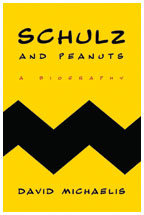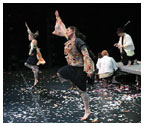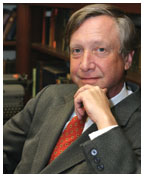November 7, 2007: Books and Arts
Reading Room
Funny man
David Michaelis ’79 pens a biography of Charles M. Schulz
Combining dance, literature, and
salesmanship
Dancer Molly Hickok ’82 plays a Japanese manservant
Lest we forget
Princeton University Press republishes seminal works of American political
thought
For a complete list of books received, click here.
David Michaelis ’79’s Schulz and Peanuts reveals the character behind the comics. |
Reading
Room
Funny
man
David Michaelis ’79 pens a biography of Charles M. Schulz
By Maria LoBiondo
Cartoonist Charles M. Schulz did not set out to make the kids cute when he created Peanuts. In fact, Schulz wasn’t particularly fond of children, with the exception of his own. But comic strips featuring kids were popular when he was breaking into the business, so Schulz drew kids — voicing the wry humor and philosophical musings of his own inner child.
The birth of Peanuts, and how deeply it reflected the psyche of its creator, is the subject of a new book by David Michaelis ’79, Schulz and Peanuts: A Biography, published by HarperCollins in October. Schulz spent 50 years drawing for newspaper funny pages; when he died in 2000, Peanuts appeared in more than 2,600 newspapers in 75 countries.
 Michaelis,
who grew up reading Peanuts, goes to great lengths to connect the dots
with Schulz’s experiences, the characters he created, and the punch
lines he wrote.
Michaelis,
who grew up reading Peanuts, goes to great lengths to connect the dots
with Schulz’s experiences, the characters he created, and the punch
lines he wrote.
From the slow demise of Schulz’s mother from cancer and his romantic rejections to the high points of his Army days and his dogged effort to make it in comics, Schulz distilled his experiences into the comic strip panels, as examples interspersed throughout the book illustrate.
When his first wife, Joyce, began revamping the Schulzes’ California property, Lucy imagines Charlie Brown becoming president — so she can redecorate the White House. The beginnings of Charles Schulz’s extramarital affair found Snoopy writing adoring love letters, closing with a crazed smile (“Dear Sweetie, Have you missed me? I think about you all the time. I can hardly wait until Sunday morning. Don’t forget ... I think I’m in love!”).
According to Michaelis, who conducted more than 200 interviews, Schulz was both self-doubting and determined, melancholy and charming, decent and caring, yet prone to blame others for situations that didn’t go his way. Interviewers asked if he was Charlie Brown so often that Schulz told them what they wanted to hear and shaped his version of his life story accordingly. “Peanuts was his life, his work, his identity, his yin and his yang,” says Michaelis, author of a prize-winning biography of illustrator N.C. Wyeth.
While Michaelis found much to admire, he also was stunned at how his subject resisted looking analytically at his life. In tapes of an unfinished interview that Michaelis discovered during his research, Schulz “bobbed and weaved” in response to questions. For example, when Schulz stated that he had felt alone all his life, the interviewer pressed him to explain how that was possible for a man with five children. “I was surprised that someone this complex hadn’t really looked deeper into his life,” Michaelis says. “He gave it all to the comic strip.”
In an Oct. 8 New York Times article, members of Schulz’s family who were interviewed by Michaelis for the book took issue with Michaelis’ portrayal of Schulz, which they felt showed him as a depressed, cold, and bitter man. They said that Schulz was much happier than he comes across in the text. Michaelis defended his work, telling Patricia Cohen *86 of the Times, “This was the man I found.”
Michaelis writes for numerous magazines, has penned a novel, and perhaps
most famously in Princeton annals, co-authored Mushroom, a headline-maker
based on roommate John Aristotle Phillips ’78’s junior paper
on how to construct an atomic bomb. But his career really blossomed with
the Wyeth book — which, coincidentally, Schulz was reading when
he died. ![]()
Maria LoBiondo is a PAW contributor.
For a complete list of books received, click here.
Molly Hickok ’82, center, performing with other cast members in The Other Here, her latest dance-theater production. (Paula Court) |
Combining
dance, literature, and salesmanship
Dancer Molly Hickok ’82 plays a Japanese manservant
By Van Wallach ’80
In her latest dance-theater piece, The Other Here, Molly Hickok ’82 plays the role of a Japanese man-servant. She smokes a pipe while lying on her back, waves a saw around, interacts with her character’s wife, and executes energetic Okinawan dance steps. She also listens to presentations taken from American insurance sales conferences.
That’s all in a night’s work for Hickok, a dancer who has spent most of her career with Big Dance Theater, a New York company known for combining dance, music, literary texts, and drama into experimental theater pieces. The Other Here, which had its final performance Sept. 29 in New York, began with a grant from the Japan Society to support Western artists exploring Japanese culture. Hickok describes the piece as a work with “disparate, counterintuitive elements.” It combines Okinawan pop music, traditional and modern Okinawan dance, two short stories by Japanese author Masuji Ibuse, and rah-rah presentations culled from sales meetings. “We wanted to add something very Western to the mix, and we found these speeches,” said Hickok, who thought the sales speeches were surprisingly earnest.
A Boston Globe critic called The Other Here “a rumination on the meaning of existence and the quest for purpose.”
Other Big Dance Theater pieces have been similarly idiosyncratic. Plan B, produced in 2004, took inspiration from the Nixon White House tapes and the life of 19th-century German “wild child” Kaspar Hauser, who was discovered on the streets of Nuremberg and suspected of being a member of a royal family. The troupe began as a dance company that added theater elements, and “now we make plays that look like dances,” says Hickok, whose dance experience includes folk, flamenco, Japanese, and Georgian.
That eclectic sourcing works well for Hickock, a self-described “cultural omnivore” from Minnesota who majored in comparative literature at Princeton and got a certificate in theater and dance. Soon after graduation, she moved to New York and joined Big Dance Theater. Hickok also holds down a highly flexible day job working for a firm that administers charities.
Besides dancing with the troupe, she gets involved in the costumes, choreography, and administration. “We look at a scene, a piece of clothing, and over time we knit them together. I’m the person who says, ‘Let’s try this,’” says Hickok.
She’s now involved in crafting the next piece, to premiere next year at a French arts festival in New York. The new work will be based on a New Wave film, possibly Chloe in the Afternoon. (New Wave films are iconoclastic French movies mostly made in the 1950s and 1960s.)
When it debuts, it will be the next step in a path that in 2005 won
Hickok a New York Dance and Performance (aka Bessie) Award, for her overall
body of work at Big Dance Theater. She muses on her path as a hoofer:
“I don’t feel like I had a career. I have a vocation. I feel
lucky. I’ve always known what I wanted to do.” ![]()
Van Wallach ’80 is a freelance writer in Stamford, Conn.
Princeton history professor Sean Wilentz is the general editor of a series of new editions of classic political texts. (Denise Applewhite/Office of Communications) |
Lest
we forget
Princeton University Press republishes seminal works of American
political thought
By Deborah Yaffe
America’s political heritage is too often shrouded in mythology, says Princeton historian Sean Wilentz — and mythology, about everything from the causes of the Civil War to the impact of the New Deal, can spawn a dangerous amnesia about successes and failures.
Wilentz’s prescription for ensuring an informed citizenry is direct contact with the political ideas that shaped our shared past. No wonder, then, that Wilentz, the Sidney and Ruth Lapidus Professor in the American Revolutionary Era, is the general editor of Princeton University Press’ James Madison Library in American Politics, a recently launched series featuring new editions of classic yet hard-to-find American political writings.
|
The series got under way in May with the publication of two books: The Conscience of a Conservative, the 1960 political manifesto of Barry Goldwater, who soon would be the Republican presidential candidate; and The New Industrial State, economist John Kenneth Galbraith’s 1967 analysis of corporate power.
This month will see two additions to the series: Liberty and the News, journalist Walter Lippmann’s 1920 discussion of the role of the press in a democracy; and a single volume containing two works by historian Arthur M. Schlesinger Jr., The Politics of Hope and The Bitter Heritage, which chronicle the optimism and disillusionment of 1960s liberals.
The wide range of authors so far — from liberal to conservative, from politician to historian — is deliberate. “I want to capture American politics in all of its variety and all of its intricacy,” says Wilentz, whose own political views are unapologetically liberal. “I’m not trying to push a line here — or, rather, I’m trying to push all the lines, because they all fascinate me.”
Coming next year is a collection of speeches and writings by Richard Nixon. A soon-to-be-established advisory board will help Wilentz pick future selections, with an emphasis on works that have contemporary resonance.
Wilentz and Princeton University Press director Peter Dougherty say they hope the books will appeal both within and beyond the academy, by offering affordable paperbacks for classroom use and by giving a general audience access to neglected texts.
So far, Dougherty says, the Goldwater book has sold 5,000 copies and the more esoteric Galbraith about half as many, although a Virginia Tech business professor ordered 500 for his students.
Key to the appeal of the series are new forewords and afterwords exploring each work’s contemporary relevance. Conservative commentator George F. Will *68 and liberal scion Robert F. Kennedy Jr. offer dueling interpretations of Goldwater’s legacy for 21st-century Republicans, for example, while economist James K. Galbraith discusses his father’s ideas in light of the rise of Microsoft and the fall of Enron.
“We’re not trying to entomb these things,” Wilentz
says. “They’re classics because they’re evergreen, they’re
alive. But it takes a little pruning and tending.” ![]()
Deborah Yaffe is a writer in Princeton Junction, N.J., and the author of the forthcoming book Other People’s Children: The Battle for Justice and Equality in New Jersey’s Schools (Rutgers University Press).







